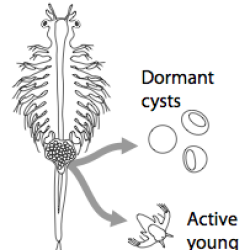Source Institutions
Source Institutions
Add to list Go to activity

In this activity, learners examine how brine shrimp populations can survive in some of the harshest environments. Learners subject brine shrimp cysts to extreme conditions to evaluate the hardiness of these creatures.
- 10 to 30 minutes
- 1 to 7 days
- Over $20 per group of students
- Ages 11 - 18
- Activity, Experiment/Lab Activity, Lesson/Lesson Plan
- English
Quick Guide
Materials List (per group of students)
- Copies of lab sheets
- Brine shrimp cysts (available from a number of biological supply companies)
- 3% salt solution (water and Instant OceanTM or non-ionized salt)
- 100 mL or larger containers for hatching the cysts
- Aquarium pump and flexible tubing (optional)
- Various materials to mimic environmental extremes (see page 8 for ideas)
Subjects
-
Life Sciences
-
Diversity of Life
- Animals
-
Ecology
- Populations
-
Evolution
- Mechanisms of Evolution
-
Diversity of Life
-
The Nature of Science
-
The Scientific Process
- Conducting Investigations
- Gathering Data
- Formulating Explanations
- Communicating Results
-
The Scientific Process
Informal Categories
- Animals
- Nature and Environment
Audience
To use this activity, learners need to:
- see
- read
- touch
Learning styles supported:
- Involves teamwork and communication skills
- Involves hands-on or lab activities
Other
This resource is part of:
Access Rights:
- Free access
By:
- Teach.Genetics, University of Utah
Source Collection
- Teach.Genetics
Rights:
- All rights reserved, University of Utah, 2009
Funding Sources:
- Westminster College
- Utah's WIRED (Workforce Innovation In Regional Economic Development) program
